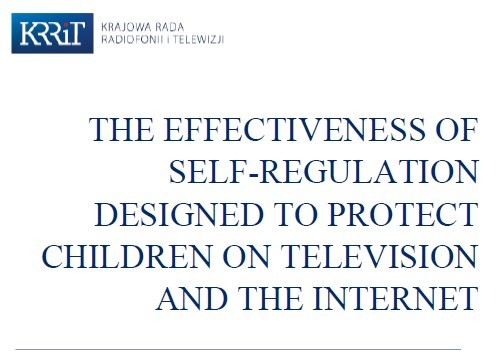Search
News categories
Protection of minors and self-regulation in Poland: KRRiT issues monitoring report
Self-regulatory system is deemed effective to protect children
A recent analysis conducted by the National Broadcasting Council of Poland, the KRRiT, confirmed the effectiveness of the self-regulation system developed by media service providers, industry associations and the KRRiT in the field of the protection of minors.
Focus on the Polish system:
In line with its statutory duties, the KRRiT supports and promotes the establishment of self-regulation codes of conduct and is entitled to regularly monitor their implementation. Providing an opportunity for the market to design flexible rules adapted to the level of protection required in an evolving audiovisual environment, these ‘codes of conduct’ aim to complement statutory provisions but might also introduce, for some of them, additional non-statutory obligations to the industry.
duties, the KRRiT supports and promotes the establishment of self-regulation codes of conduct and is entitled to regularly monitor their implementation. Providing an opportunity for the market to design flexible rules adapted to the level of protection required in an evolving audiovisual environment, these ‘codes of conduct’ aim to complement statutory provisions but might also introduce, for some of them, additional non-statutory obligations to the industry.
In this recently published report, the Polish audiovisual regulator analysed the effectiveness of three self-regulatory acts:
-
The Agreement of TV broadcasters on the rules on broadcasting advertisements and sponsor references concerning food or beverages containing ingredients whose presence in excessive amounts in the daily diet is inadvisable (HFSS): The Agreement aims at preventing such commercial communication in programmes targeting children. The KRRiT notes that the good practice is generally well followed by broadcasters of channels dedicated to children, even by those who did not sign the Agreement. Some efforts still remain to be done regarding commercial messages for fast-food trademarks and advertising on channels non-specifically dedicated to children but with programmes attracting a large audience of children.
-
The Code of Good Practice on detailed rules for the protection of minors in on-demand audiovisual media services: Adopted in 2014, this code requires that on-demand services implement an appropriate system of authorisation preventing minors’ access to unsuitable content. The KRRiT welcomes the high level of compliance with this rule. However, he new ‘prepaid cards’ which might allow minors to circumvent the mechanism in place raise some concern. Furthermore, the report calls on on-demand providers to carefully analyse their offer to ensure an appropriate classification of their content.
-
The Charter for the Protection of Children in Advertising: Recently adopted, this Charter intends to ban from commercial communications targeting children any material that might impair their development. Reaching a rate of implementation of 99%, this Charter seems to have achieved a larger impact than expected, leading also to a removal of harmful material from commercials only indirectly aimed at children and young people.
The Polish regulator concludes that the system currently in place allows the market to develop its own responses and mechanisms to reach an appropriate level of protection. It should however be noted that the KRRiT “still retains full power to regulate the issues in question on its own in the event that self-regulation proves ineffective and insufficient”.
- The effectiveness of self-regulation designed to protect children on television and the Internet [EN]
- Press release [EN]